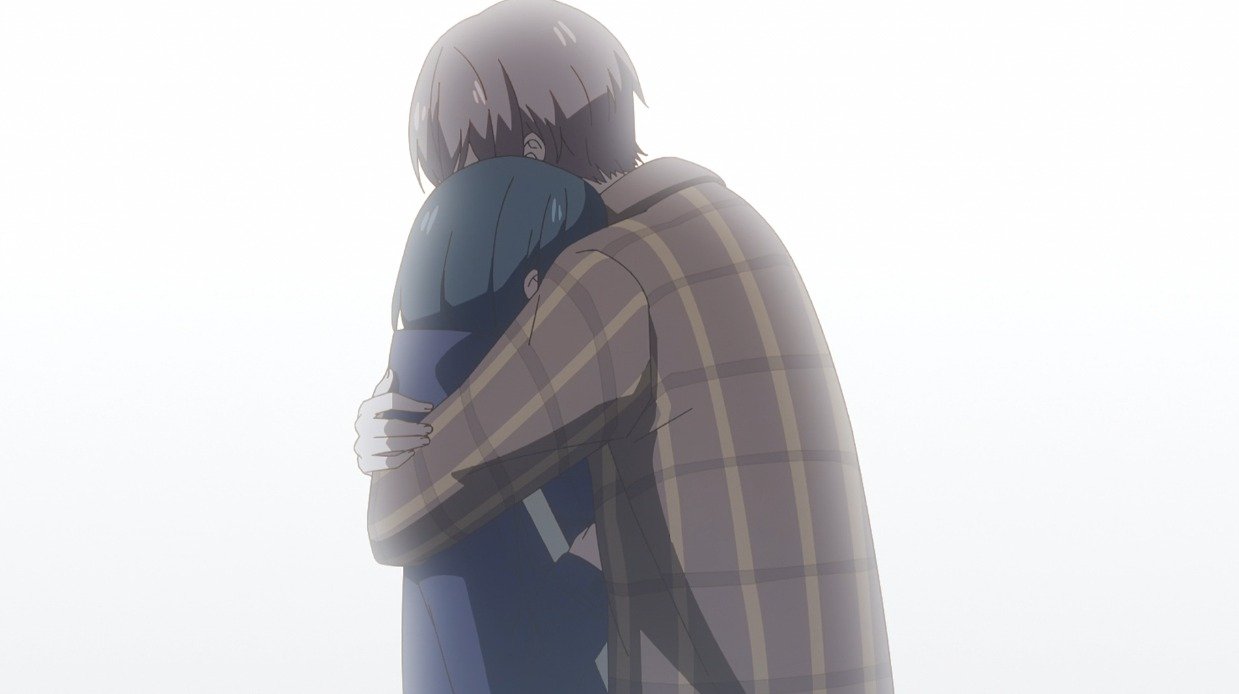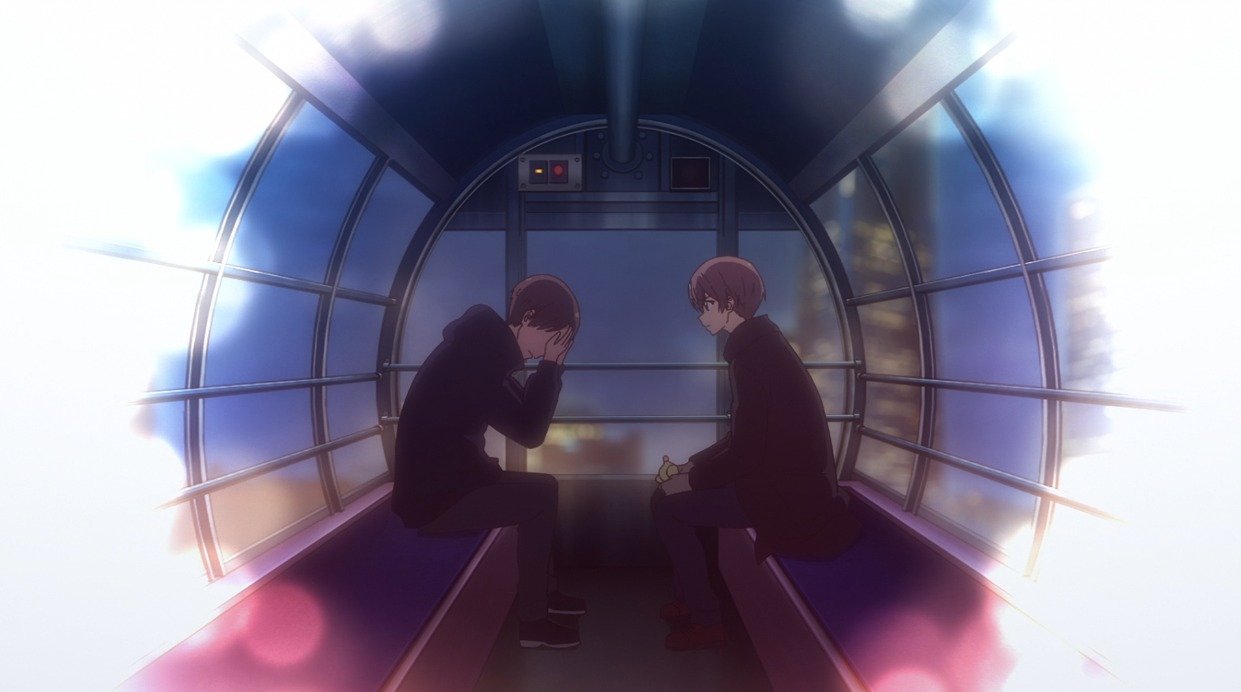Season aired: Summer 2024
Number of episodes: 12
Watched on: Crunchyroll
Translated by: ?
Genres: Romance, Drama
Thoughts: Senpai is an Otokonoko was rated as one of the series manga readers in Japan would like to see animated, which was a welcoming surprise to me when I read the synopsis. Aoi decides to confess to Makoto-senpai, a fellow girl student, but is surprised to learn that her senpai is an otokonoko — a boy who dresses as a girl. Nevertheless, she proclaims her love for both of his sides, which brings her the attention of Ryuuji, Makoto’s childhood friend who may or may not have his own complicated feelings for Makoto. Together, the three navigate their high school lives together.
This story, at its heart, is a coming-of-age story about three queer students. Aoi is bisexual, Ryuuji is gay, and Makoto, through the course of the story, comes out as non-binary. Because the character goes by and responds to he/they pronouns, for continuity and clarity, I will refer to Makoto as they. Out of the three, Aoi is the most nonplussed about her queerness as her inner turmoil lies in her fear of and desperation for love rather than her sexuality, but her lack of a queer discovery doesn’t make her story any less important. At the end of the day, these are three complex and kind students who are growing into their identities while seeking love and friendship along the way.

For that matter, the anime succeeded. What I like about the protagonists’ separate character arcs are the different obstacles that they face. Makoto has already come to terms with who they are, but their gender identity is constantly a point of contention with their mom, whose obsession with keeping Makoto as “boy-like” as possible started as early as elementary school. Meanwhile, Ryuuji feels no pressure from any outside factors. His parents and younger sister are openly affectionate and supportive, and his classmates like him enough that he could be considered popular. However, his disgust, denial, and pain about being attracted to Makoto are self-inflicted in the most vicious of ways through internalized homophobia despite having no trouble embracing either Aoi’s or Makoto’s sexuality and gender identity. Aoi’s antagonist, on the other hand, is her insistence that there isn’t one. Abandoned by her mom and with an absent dad, Aoi chooses to run away from her feelings — pretending to always be a happy, chipper girl who’s supportive of everyone, even when her heart is broken, and never reacts with anger. Having the three characters face different villains makes each of their journeys unique, well integrated, and non-repetitive to the story.
Additionally, I love the relationship between all three. This is a love triangle, but in many ways, it feels more like a friendship story than a love story. The three are each other’s strongest cheerleaders, and they soon become inseparable despite the hardships they individually face. There were many times the series brought me to actual tears. In each of the characters’ lowest points, the other two always presented themselves to comfort the other and be by their side in unconditional love.

Senpai is an Otonoko’s greatest weakness is its production. Many fans cried out in disappointment when they heard Project No.9 was animating the series, and it’s easy to understand. That studio has become infamous for its horrible animation, complete lack of visual direction, and character designs so bland that the only distinguishing feature is their hairstyle.
I am happy to tell you that Senpai is an Otokonoko‘s production isn’t a complete disaster, and in fact, actual visual direction is present. In one of the episodes, Makoto sees Aoi in distress for the first time. When Aoi begins crying and acknowledging the adults who abandoned her, Makoto reaches over to hug her tightly. In that exact moment, Ryuuji, who has just confessed his romantic feelings for Makoto, sees them hugging. Unlike other romantic dramas, where the love triangle becomes messy and vicious, this scene serves as melancholic for all three characters. The scene portrays two different perspectives in the form of traffic mirrors sitting under the streetlight. In one mirror, it reflects Ryuuji standing alone after spending the last few episodes doubting his place in Makoto’s life. In the other, it reflects Makoto and Aoi together, seemingly solidifying Ryuuji’s worst fear of not having a place in their triangle friendship. We watch him walk away in the reflection of the street mirror, and the scene shifts to him actually walking home in the dark. This moment alone proves thought was put into this series, unlike all the other anime the studio has adapted so far.
However, the overall animation quality is barebones. It’s decent enough to not be distracting, but that’s only because it’s constantly interrupted with simpler, chibi portrayed scenes that don’t require as much animation. The series’ art direction also doesn’t stand out through its character designs or backgrounds. The only piece Project No.9 paid attention to are the outfits Makoto wears, which is an important element to their whole character. Even the soundtrack made no impact — I wouldn’t be able to tell which scores came from Senpai is an Otokonoko if I listened.

However, the voice acting is good. My favorite is Yuuma Uchida, whose portrayal of Ryuuji is simultaneously heartbreaking and uplifting. This isn’t Yuuma Uchida’s first rodeo. In fact, he came to fame from voicing tortured teen boys with a heart of gold, and once again proves his great talent through his emotional and nuanced performance of Ryuuji.
It’s telling when so many of the technical aspects of the story fall flat but a series like Senpai is an Otokonoko still manages to draw me in from the first to the last episode. What starts off appearing like a queerbaiting love triangle is actually a heartfelt story about gender identity, sexuality, friendship, and love. Queer characters and relationships are important stories to be shown on screen, and maybe sometime in the not-so-distant-future, stories like these will receive the production they deserve.
Rating
Plot: 8 (Multiplier 3)
Characters: 7.5 (Multiplier 3)
Art/Animation: 5 (Multiplier 2)
Voice acting: 7
Soundtrack: 6
FINAL SCORE: 66.5
